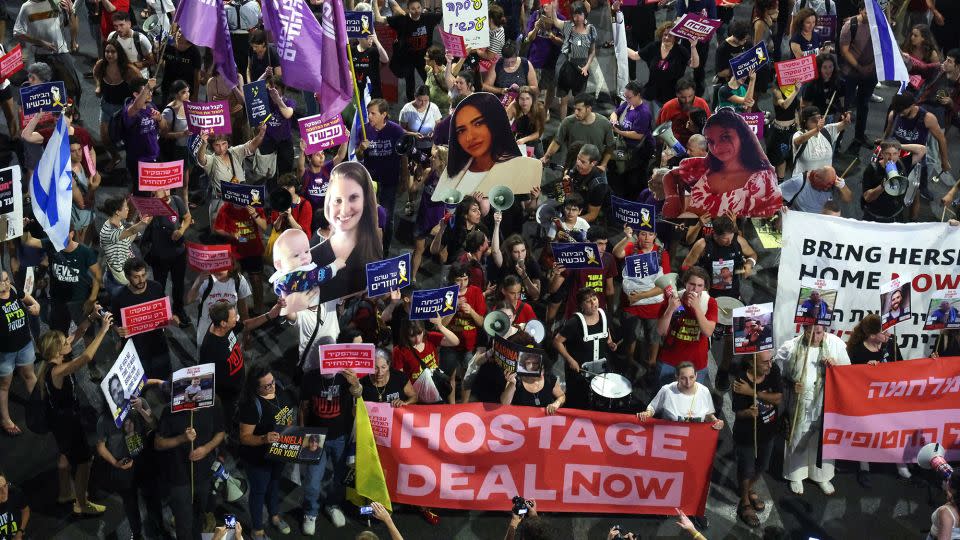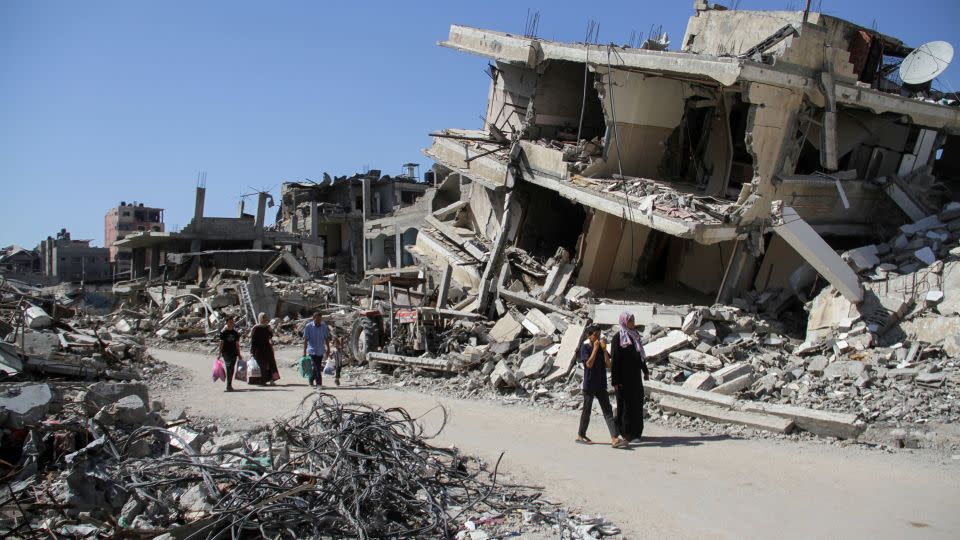US proposes new language to revive stalled Israel-Hamas ceasefire efforts
- Oops!Something went wrong.Please try again later.
- Oops!Something went wrong.Please try again later.
The United States has proposed new language to bridge gaps in discussions for a ceasefire and hostage deal between Israel and Hamas, a senior US administration official said Friday.
The three-phase Israeli proposal, outlined by US President Joe Biden last month, sets out conditions intended to lead to the eventual release of all remaining hostages being held by Hamas, in return for a permanent ceasefire and withdrawal of Israeli forces from Gaza.
But dashing hopes for a breakthrough, earlier this month Hamas responded to the Israeli proposal with further amendments. Israel has also not publicly accepted the plan.
CNN contributor Barak Ravid first reported the news in Axios, citing three unnamed sources with direct knowledge.
The US is pushing Egypt and Qatar to press Hamas to accept the change in language, according to Ravid. One source cited by Ravid said that if Hamas accepts the new language, it will “allow to close the deal.”
According to the sources cited by Ravid, the new language presented by the US focuses on the period during the first phase of the proposal where Israel and Hamas are expected to start more negotiations with the intention of activating a second phase, where a sustainable ceasefire in Gaza is implemented.
The proposed US language aims to bridge a current disagreement triggered by Hamas’ demands that negotiations for the second phase only focus on the number and identity of Palestinian prisoners released from Israeli jails as part of the deal, while Israel wants to have the ability to raise demilitarization of Gaza and other issues, the sources said according to Ravid.
CNN has not seen the latest proposal and has reached out to Qatari and Egyptian officials.

The second phase of the proposal has been a source of disagreement in the months-long negotiation between Israel and Hamas. Hamas has called for a permanent end to the war and a complete Israeli military withdrawal, while Israeli politicians, including Prime Minister Benjamin Netanyahu, had vowed for the continuation of the war until Hamas are eliminated.
On Sunday, Netanyahu told Israel’s Channel 14 he was ready to make “a partial deal” with Hamas to return only some hostages from Gaza, in comments that were at odds with the proposal. Netanyahu added that Israel will continue fighting in the enclave after the ceasefire.
He walked back the comments a day later after fierce backlash from families of the hostages and several Israeli politicians.
Hamas spokesman Osama Hamdan told a news conference in Beirut Saturday that the most recent proposal it received was on June 24 and it fell short of meeting its demands for a permanent ceasefire and complete withdrawal of Israeli forces from the Gaza Strip.
“There is no real change in the negotiation to stop the hostilities until now, what is being reported on behalf of the US administration is within the context of applying pressure on (Hamas) to accept the Israeli proposal without any amendments,” Hamdan said.
Any proposal that did not include Hamas’s core demands on a ceasefire and withdrawal was “a waste of time,” Hamdan added.
He cited Netanyahu’s remarks in the Channel 14 interview as showing that Israel will “continue refusing to accept a permanent ceasefire and do not accept a complete withdrawal from the Gaza Strip.”
Hamdan said he holds Netanyahu and his government responsible for the stall, describing Israel’s position as an “equivocation and evasion” from the articles of the agreement. He also accused the US administration of being “conniving” in holding Hamas responsible for stalling the agreement, saying the group welcomed Biden’s speech at the end of May and the UN Security Council resolution endorsing the proposal on the table.

An Israeli government official said late Saturday that Israel is committed to the wording of the proposal that Biden welcomed and that its position has not changed.
“Up to this moment, Hamas has not responded to this proposal,” the official said.
Fighting meanwhile continued in a neighborhood of Gaza City, according to the Israel Defense Forces (IDF) and local officials, months after Israel said it had dismantled Hamas in the north.
“Troops are continuing operational activity against terror targets in the Shejaiya area, fighting simultaneously above and below ground,” the IDF said, adding that the Israeli Air Force “struck terror targets and armed terrorist cells” as part of their operations in the neighborhood, which began on Thursday.
Gaza’s civil defense officials said they had received numerous calls for help from injured people trapped by fighting in Shujaiya.
“A number of victims are still under the rubble and on the roads, and ambulance and civil defense crews cannot reach them,” the Palestinian Ministry of Health in Gaza said.
The total number of Palestinians killed in Gaza since Oct. 7 is now 37,834, while the number of injuries has risen to 86,858.
For more CNN news and newsletters create an account at CNN.com

